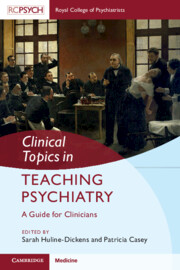Book contents
- Clinical Topics in Teaching Psychiatry
- Clinical Topics in Teaching Psychiatry
- Copyright page
- Dedication
- Contents
- Contributors
- A Note on the Cover
- Introduction
- Section 1 Teaching and Preparation
- Chapter 1 Improving Patient Care through Continuing Professional Development
- Chapter 2 The MRCPsych: Preparing Trainees and Improving Courses
- Chapter 3 Going Beyond ‘Good Enough’ Teaching in Psychiatric Training
- Chapter 4 A Guide to Conducting an Online Literature Search for Medical Educators
- Chapter 5 Writing for Learning and Publication
- Section 2 Teaching Methods
- Section 3 Feedback, Assessment and Supervision
- Section 4 Bridging the Gaps: Foundation Years and Interprofessional Education
- Section 5 Technologies Old and New
- Section 6 Supporting the Trainee in Difficulty
- Index
- References
Chapter 5 - Writing for Learning and Publication
from Section 1 - Teaching and Preparation
Published online by Cambridge University Press: 24 November 2022
- Clinical Topics in Teaching Psychiatry
- Clinical Topics in Teaching Psychiatry
- Copyright page
- Dedication
- Contents
- Contributors
- A Note on the Cover
- Introduction
- Section 1 Teaching and Preparation
- Chapter 1 Improving Patient Care through Continuing Professional Development
- Chapter 2 The MRCPsych: Preparing Trainees and Improving Courses
- Chapter 3 Going Beyond ‘Good Enough’ Teaching in Psychiatric Training
- Chapter 4 A Guide to Conducting an Online Literature Search for Medical Educators
- Chapter 5 Writing for Learning and Publication
- Section 2 Teaching Methods
- Section 3 Feedback, Assessment and Supervision
- Section 4 Bridging the Gaps: Foundation Years and Interprofessional Education
- Section 5 Technologies Old and New
- Section 6 Supporting the Trainee in Difficulty
- Index
- References
Summary
A useful aim for all psychiatrists is to write at least one competent, not necessarily first-rate, article or chapter on a subject on which they have become an expert. ‘I am never going to be an expert’, we hear some of you say, but this is simply not true. Everyone can become an expert in one area, even it is very tiny indeed. So, for example, if you come across someone in your practice who has the feeling of ants crawling over their skin, commonly called formication (please get the spelling right), and this is severe and troubling, you might want to write a review of ‘formication in psychiatry’. You will find about 50 published references on the subject but not very many from psychiatry.
- Type
- Chapter
- Information
- Clinical Topics in Teaching PsychiatryA Guide for Clinicians, pp. 55 - 62Publisher: Cambridge University PressPrint publication year: 2022



